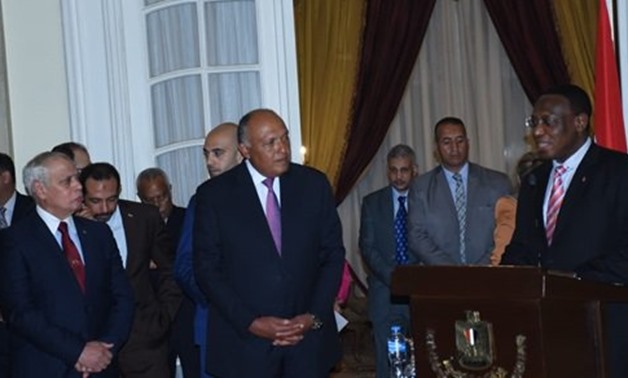TUNIS, Tunisia, June 13 (NNN-TAP) – The tripartite meeting of foreign ministers of Egypt, Tunisia and Algeria, held a consultative meeting on the situation in Libya, on Wednesday, according to a statement issued by the Foreign Ministry.
The meeting comes, as a follow up to the implementation of a tripartite presidential initiative, to reach a comprehensive political settlement to the Libyan crisis.
The statement concluded by pointing out that the Tunis meeting comes as a complement to the successive ministerial meetings of the tripartite ministerial mechanism on Libya, held alternately between the capitals of the three countries, where Cairo hosted the last meeting on March 5, 2019.
The three foreign ministers will probe ways to halt the current fighting in the North African country and resume the UN-sponsored political process among Libyan factions, especially in light of the ongoing armed clashes in the vicinity of Tripoli, according to a statement by the Tunisian Foreign Ministry.
They also discussed the latest developments in the Libyan arena and steps required to encourage the warring parties to stop the fighting and return to the negotiating table, which in turn could help end the bloodshed and preserve Libya’s sovereignty and territorial integrity, the statement added.
The three countries have so far hosted six meetings, as part of the Tunis Declaration signed on Feb 20, 2017, to find a comprehensive political settlement in Libya.
In March, 2019, foreign ministries of Egypt, Tunisia and Algeria held a tripartite meeting in Cairo, to discuss the developments on the Libyan scene and possible political solutions to its crisis.
The three ministers asserted their commitment to backing Libya and its people, in that critical phase of its history. The ministers added, they would help in achieving national reconciliation in a way that reinstates security and stability in the entire country, affirming their support to Libya’s territorial integrity, unity, independence, and sovereignty.
The major obstacle in the face of any international or Arab participation in ending the crisis in Libya is the lack of a Libyan partner that would support any mediation. Since 2014, there are two major factions on the ground, one led by Field Marshal Khalifa Haftar, commander of the Libyan National Army, who now controls the eastern side of Libya and works in cooperation with the government of the House of Representatives, known as the Tobruk government. The other is led by Fayez al-Sarraj, head of the UN-backed Libyan Government of National Accord.
Therefore, there is no official side recognised by all parties in Libya, but there are two opposing factions, roughly equivalent in terms of power, competing for legitimacy. Nonetheless, neither side appears to be able to tip the scales of this conflict in its favour.
Egypt is aware that any intervention in Libyan affairs will enrage the Libyan people due to religious and national sensitivities.
Therefore, Egypt called for a meeting in Aug, 2014, to discuss the formation of a coalition force with the United States and other Arab nations. The final recommendation of the meeting, held in Cairo, did not suggest the formation of any Arab or international military intervention in Libya, but it called for the immediate cessation of all armed operations, in order to support the political process in Libya.
In Dec, 2015, the Skhirat Agreement was signed by major parties in the Libyan conflict, under the supervision of UN envoy, Martin Kobler in the city of Skhirat, Morocco. The agreement recommends a peaceful transition of power and the establishment of a national unity government. However, the agreement failed to achieve the desired stability on the ground because it lacked consensus.
In Dec, 2016, Cairo hosted a conference attended by Libyan officials and representatives from the country’s numerous factions, where they issued five proposed amendments to the agreement. The conference concluded with a decision to amend the eighth article of the Skhirat Agreement that outlined the jurisdiction of the Libyan army chief.
Negotiations to unify the Libyan military were held as a part of Egypt’s initiative that kicked off in July, 2017, to unify the military institutions. The first meeting aimed at creating a framework for the initiative, while the second and third meetings were held in Cairo from Oct 29 to Nov 2, 2017, to follow up on the results of the first meeting.
The fourth meeting was held from Dec 6 to 9, to restructure the Libyan army.
Egyptian Officials met again with Libyan military forces in Cairo on Feb 21, 2018, in order to continue the discussions. The meetings delved into the methods used to unify and restructure the Libyan military forces, after a long split that resulted from the outbreak of the Libyan revolution in 2011.
The sixth round of the negotiation on the unification of the Libyan military establishment was held on March 23 in Cairo.
In a press release issued at the conclusion of the meeting, the Libyan factions agreed to resume their talks in an attempt to complete the establishment of the four technical committees that the Libyan factions agreed on forming, during the previous rounds of talks as an initial step towards the consolidation of the military establishment of Libya.
Members of the Security Council welcomed recent efforts to strengthen an inclusive political dialogue among all Libyans, supported by Libya’s neighbours, international partners and regional organisations within the framework of the Libyan Political Agreement, endorsed by UN Security Council Resolution 2259.– NNN-TAP






